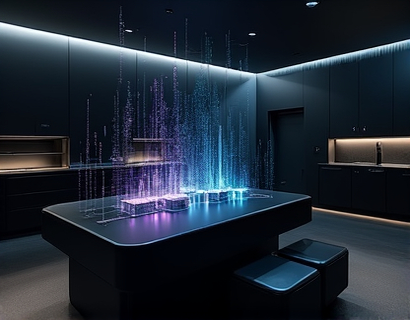Transform Your Mind: Mastering Relaxation and Stress Relief with Cutting-Edge Meditation Technology
In today's fast-paced world, stress has become an inevitable part of our lives. The constant demands of work, family, and social obligations can leave us feeling overwhelmed and anxious. However, finding effective ways to manage stress and achieve relaxation is essential for maintaining mental well-being. One of the most powerful tools available today is meditation, enhanced by cutting-edge technology. This article explores how advanced meditation software can transform your mind, helping you master relaxation and stress relief.
The Importance of Relaxation and Stress Relief
Relaxation is not just a luxury; it is a necessity for our mental and physical health. Chronic stress can lead to a variety of health issues, including anxiety, depression, and cardiovascular problems. Therefore, incorporating relaxation techniques into our daily routine is crucial. Stress relief allows us to recharge, improve our focus, and enhance our overall quality of life.
Understanding Meditation
Meditation is a practice that has been used for thousands of years to promote relaxation and mindfulness. It involves focusing the mind and eliminating distractions to achieve a state of calm and clarity. There are various forms of meditation, including mindfulness meditation, guided meditation, and transcendental meditation, each offering unique benefits. The key to successful meditation lies in finding the right approach that resonates with you.
How Technology Enhances Meditation
With the advent of technology, meditation has become more accessible than ever. Advanced meditation software provides users with a range of tools designed to enhance their practice. These platforms often include guided sessions, calming soundscapes, and mindfulness tools that cater to individual needs. By leveraging technology, individuals can experience a more immersive and effective meditation experience.
Guided Meditation Sessions
One of the standout features of meditation software is the availability of guided sessions. These sessions are led by experienced instructors who provide step-by-step instructions, making it easier for beginners to get started. Guided meditations can focus on various themes, such as stress relief, self-compassion, or gratitude, allowing users to choose sessions that align with their goals.
Calming Soundscapes
Sound plays a significant role in meditation. Calming soundscapes, such as nature sounds, ambient music, or binaural beats, can enhance relaxation and help users enter a meditative state more easily. Many meditation platforms offer a variety of sound options, allowing individuals to customize their experience and find the perfect backdrop for their practice.
Mindfulness Tools
In addition to guided sessions and soundscapes, meditation software often includes mindfulness tools that help users integrate mindfulness into their daily lives. These tools may include reminders to practice mindfulness throughout the day, journaling features to reflect on thoughts and feelings, and progress tracking to monitor improvements over time. By incorporating these tools, individuals can cultivate a more mindful approach to life.
Benefits of Using Meditation Software
The benefits of using meditation software extend beyond just relaxation. Here are some of the key advantages:
- Accessibility: Meditation software is available on various devices, making it easy to practice anywhere, anytime.
- Personalization: Users can tailor their meditation experience to suit their preferences and needs, ensuring a more effective practice.
- Consistency: Regular use of meditation software can help establish a consistent meditation routine, which is essential for reaping the benefits of meditation.
- Community Support: Many platforms offer community features, allowing users to connect with others on a similar journey, share experiences, and provide support.
Integrating Meditation into Your Daily Routine
To experience the full benefits of meditation, it is essential to integrate it into your daily routine. Here are some tips to help you get started:
Set a Regular Time
Choose a specific time each day to practice meditation. Whether it's in the morning, during lunch, or before bed, consistency is key to developing a habit.
Create a Dedicated Space
Designate a quiet and comfortable space for your meditation practice. This space should be free from distractions and conducive to relaxation.
Start Small
If you're new to meditation, start with short sessions, gradually increasing the duration as you become more comfortable. Even a few minutes of meditation can make a significant difference.
Be Patient
Like any skill, meditation takes time to master. Be patient with yourself and allow your practice to evolve naturally.
Overcoming Common Challenges
Many individuals face challenges when starting a meditation practice. Here are some common obstacles and how to overcome them:
Restlessness
It's normal to feel restless or fidgety during meditation, especially when you're just starting. To combat this, try focusing on your breath or using a guided session to help anchor your attention.
Distractions
External distractions can disrupt your practice. Consider using noise-canceling headphones or playing calming soundscapes to create a more focused environment.
Self-Doubt
Many people doubt their ability to meditate effectively. Remember that meditation is a personal journey, and there is no right or wrong way to practice. Trust the process and be kind to yourself.
Exploring Different Meditation Techniques
While guided meditation is a popular choice, there are various techniques to explore. Here are a few to consider:
Mindfulness Meditation
This technique involves paying attention to the present moment without judgment. It encourages awareness of thoughts, feelings, and sensations, promoting a sense of calm and acceptance.
Transcendental Meditation
Transcendental meditation involves the use of a mantra, a specific word or phrase repeated silently to help focus the mind. This technique is known for its simplicity and effectiveness.
Loving-Kindness Meditation
This practice focuses on cultivating feelings of compassion and love towards oneself and others. It involves repeating phrases that express goodwill and kindness, fostering a sense of connection and empathy.
Creating a Supportive Environment
To enhance your meditation practice, consider creating a supportive environment. Here are some suggestions:
Minimize Distractions
Turn off notifications on your devices and find a quiet space where you won't be interrupted. This will help you focus and fully immerse yourself in your practice.
Use Aromatherapy
Incorporating calming scents, such as lavender or sandalwood, can enhance relaxation and create a soothing atmosphere for meditation.
Incorporate Movement
Some individuals find that incorporating gentle movement, such as yoga or stretching, before meditation can help release tension and prepare the body for stillness.
Tracking Your Progress
Monitoring your meditation practice can provide valuable insights into your progress and help you stay motivated. Many meditation software platforms offer tracking features that allow you to log your sessions, set goals, and reflect on your experiences. Consider keeping a journal to document your thoughts and feelings before and after each session, helping you identify patterns and areas for growth.
Conclusion
Transforming your mind through meditation is a powerful journey that can lead to profound relaxation and stress relief. By utilizing advanced meditation software, you can access a wealth of resources designed to support your practice. From guided sessions to calming soundscapes and mindfulness tools, these platforms empower you to cultivate a peaceful mind and a balanced life. As you embark on this journey, remember that consistency, patience, and self-compassion are key. Embrace the transformative power of relaxation and take the first step towards a more fulfilling life today.










































